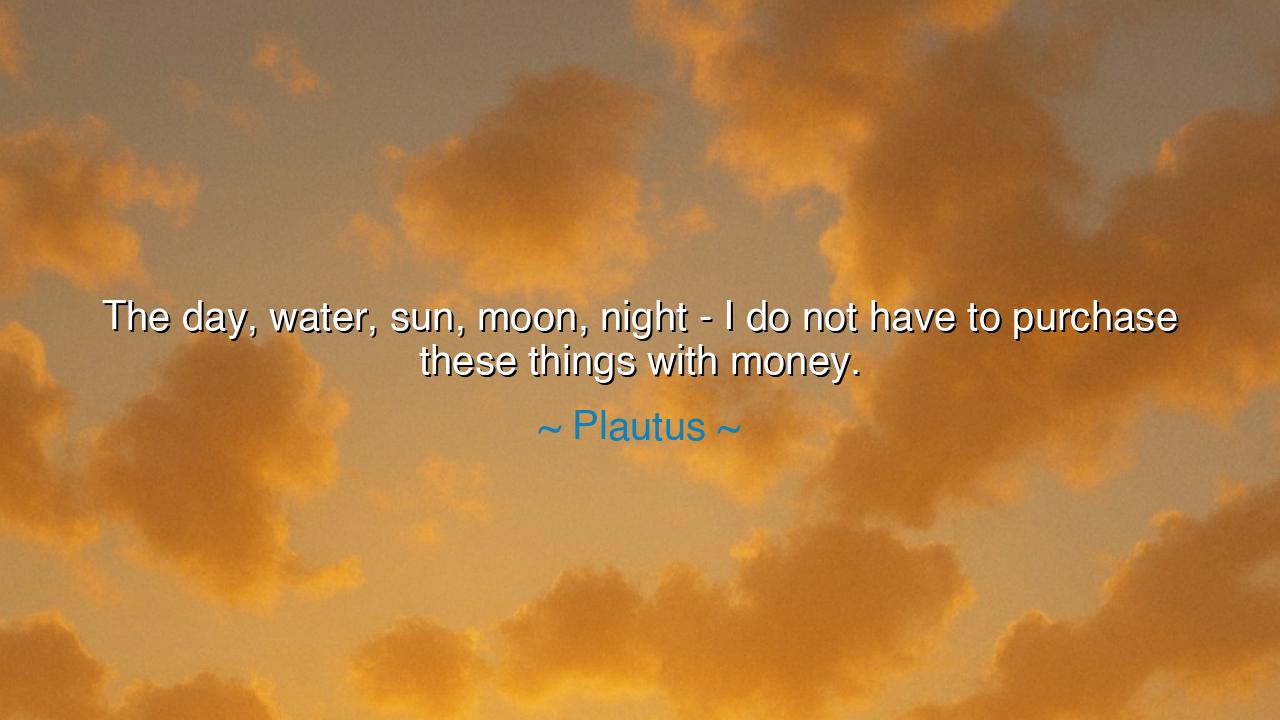
The day, water, sun, moon, night - I do not have to purchase






Hearken, children of the ages, and attend to the words of Plautus, the ancient Roman playwright, who proclaimed with clarity and wisdom: "The day, water, sun, moon, night—I do not have to purchase these things with money." Here lies a meditation upon the gifts of nature, the bounty of life that flows freely to all who open their eyes and hearts. Plautus reminds us that the most essential treasures—light, air, time, and the rhythms of the cosmos—are given without cost, enduring beyond the reach of wealth, power, or human acquisition.
In these words, the day rises and sets for all, the water quenches thirst freely, the sun warms, the moon glows, and the night offers rest. These are the fundamental blessings of existence, available not through labor or commerce alone, but through the simple act of being present in the world. Plautus urges us to recognize the profound abundance that surrounds us daily, often overlooked in the pursuit of material wealth. The richest life is not measured by possessions, but by attentiveness to these eternal gifts.
Consider the example of Henry David Thoreau, who retreated to Walden Pond to live simply and mindfully. He discovered that the most profound joys—the rising sun, the cool waters, the quiet nights—required no purchase nor permission. Thoreau’s life illustrates Plautus’s truth: that engagement with the natural world, with its cycles and offerings, brings a wealth that surpasses gold or silver. In the simplicity of daily observation, he found a treasure invisible to those who measure life by commerce alone.
Plautus also teaches that the essential wealth of human life is not transferable or monopolized. While money can buy goods, influence, and convenience, it cannot summon the sun, call forth the moon, or conjure the day. These are universal gifts, shared freely, yet often taken for granted. To live fully, one must cultivate gratitude and awareness, recognizing the miraculous ordinary—the eternal rhythms that sustain all life without cost.
Reflect upon the historical example of Ancient Greek philosophers, such as Epicurus, who taught that pleasure and contentment arise not from accumulation, but from appreciating the natural gifts of life: friendship, observation, and the cycles of nature. They understood, as Plautus does, that the greatest joys—sunlight on the skin, the coolness of water, the serenity of night—are freely given, and that the pursuit of wealth cannot surpass the wealth inherent in these gifts.
The lesson is clear: turn your attention away from the ceaseless chase for material gain, and attend instead to the timeless riches that surround you. Observe the sun rising, the moon waxing, the water flowing, the day unfolding, and the night settling. These are the treasures of life, constant and universal, available to all who pause, reflect, and participate in the natural order.
Practical action flows naturally: rise early to witness the day, drink water with mindful gratitude, watch the moon traverse the night sky, and allow the stillness of darkness to restore your spirit. Walk barefoot in grass, feel the warmth of the sun, and recognize that the most enduring wealth is not held in hands but in the heart. By practicing presence and gratitude, one discovers that life’s true riches require no purchase.
Thus, Plautus’s wisdom endures as both guidance and inspiration: the day, water, sun, moon, night are gifts beyond commerce, and those who honor them cultivate a life rich in wonder, humility, and contentment. Let all who hear remember that the earth itself, and the cosmos above, provide a treasury of joy and sustenance, freely available to those who awaken to their splendor.
If you wish, I can also craft a poetic, audio-ready version of this passage, where the cadence mirrors the rising sun, flowing water, and unfolding night, enhancing the meditative and evocative quality of Plautus’s insight. Do you want me to do that?






AAdministratorAdministrator
Welcome, honored guests. Please leave a comment, we will respond soon